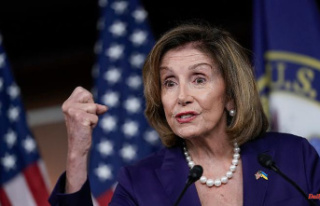A good five months after the start of the Russian war of aggression, the first ship with grain on board left the Ukraine. The long-demanded end to the grain blockade has had a positive impact worldwide. The political leadership in Kyiv is also cautiously optimistic. Meanwhile, the dispute over Russian warfare continues. The US accuses Russia of "nuclear saber-rattling" while the Kremlin calls for no nuclear war. According to US information, Russian soldiers in Ukraine are said to be using a nuclear power plant as a shield for their own artillery. The night of war at a glance:
Zelenskyj: "Chance to stop food crisis"
After the resumption of grain exports, Ukrainian President Volodymyr Zelenskyj was cautiously optimistic that he would be able to solve the global supply crisis and boost his own economy. "The port has started to work and this is a positive sign that there is a chance to stop the development of the food crisis in the world," Zelenskyy said in his daily video message on Monday evening. According to him, 16 more ships are waiting in the ports to be dispatched.
Zelenskyj made it clear that the implementation of the grain agreement, which provides for an end to the Russian naval blockade, is also of enormous importance for Ukraine. It's not just about billions in foreign exchange earnings. "About half a million Ukrainians are involved in growing export agricultural products, and if we add related industries, that's an additional million jobs," he said. A spokesman for the Russian military assured that Russia would honor its commitments to implement the agreement. Moscow has taken all measures to guarantee the safety of shipping in the Black Sea.
Baerbock: "Small gesture of humanity"
In New York, Foreign Minister Annalena Baerbock welcomed the departure of the first grain freighter as a "small gesture of humanity". Meanwhile, Federal Minister of Agriculture Cem Özdemir emphasized the need to develop alternative transport routes for grain from Ukraine. "It's about permanent alternatives, not temporary ones," said the Green politician of the "Rheinische Post". "I want to persuade the EU Commission to push for the expansion of alternative export routes." Ukraine should no longer be dependent on Russia on this issue.
Blinking: Russian army uses nuclear power plants as a shield
Meanwhile, criticism of Moscow also came from New York: US Secretary of State Antony Blinken accused Russia of using its nuclear weapons for ruthless threats of war. Earlier statements by Kremlin chief Vladimir Putin that military aid could have unprecedented consequences for Ukraine were "dangerous nuclear saber-rattling," said Blinken at the start of the NPT review conference in New York. The statements are contrary to international agreements. "There is no place in our world for nuclear deterrence based on force and intimidation or blackmail. We must stand together to oppose it."
Also speaking on the sidelines of the conference, Blinken said the US government is also "deeply concerned" that Russia has seized several nuclear power plants in Ukraine. With regard to the Ukrainian nuclear power plant Zaporizhia, for example, there are credible reports that Russia is using the plant as a kind of protective shield - that is, shooting at Ukrainian forces from close to the plant. The Ukrainians could not fire back because it could lead to a terrible nuclear accident. The media had previously reported that Russian artillery in particular had entrenched themselves in the area of the nuclear power plant and were shooting at Ukrainian positions from there.
Ukraine accuses Russia of "nuclear terrorism".
Kyiv has sharply criticized Moscow for indirect threats to use nuclear weapons in the course of Russia's war of aggression against Ukraine. "The world is witnessing how nuclear terrorism, sponsored by a nuclear-armed state, is becoming a reality," Deputy Foreign Minister Mykola Tochytskyi said at the start of the Nuclear Non-Proliferation Treaty (NPT) review conference in New York, according to the speech. Robust collective action is needed to prevent a nuclear catastrophe. No-fly zones would have to be set up over Ukrainian nuclear power plants.
Putin does not want to start a nuclear war
Kremlin chief Vladimir Putin countered fears that Moscow might use nuclear weapons in Ukraine, which had been growing since the beginning of the war. "We assume that there can be no winners in a nuclear war and that it must never be started," Putin wrote in a welcoming address to the participants of the NPT conference in New York. Russia will stick to its obligations under the Nuclear Non-Proliferation Treaty.
Moscow imposes new entry bans on Brits
Despite this, tensions with the West continue to increase: On Monday, the Russian Foreign Ministry blacklisted a further 39 politicians, businessmen and journalists from Great Britain, including ex-Prime Minister David Cameron. In Great Britain alone, 255 people are now affected by the Russian sanctions. In addition, the Russian leadership declared the non-profit British organization Calvert 22 Foundation, which specializes primarily in cultural exchange with Eastern Europe, to be an undesirable organization in Russia, which is effectively tantamount to a ban.
What will be important on Tuesday












